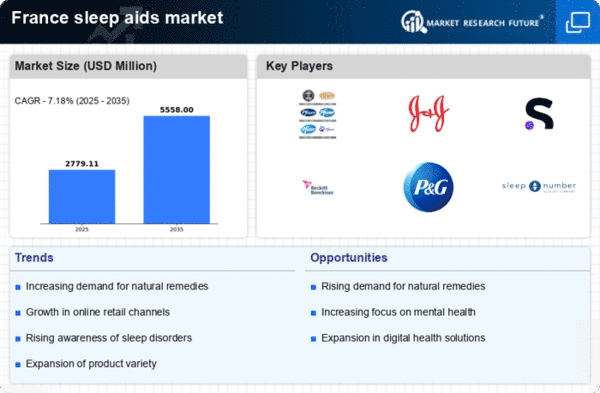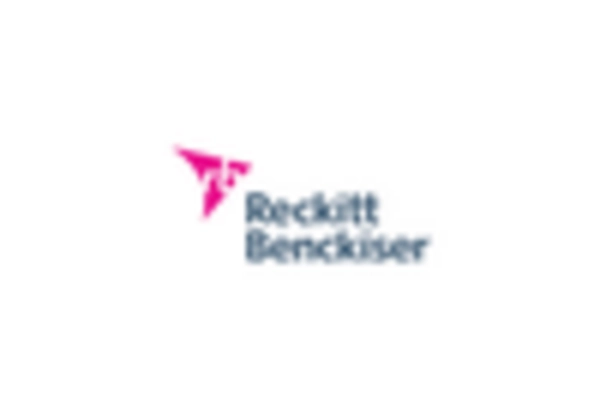Aging Population and Sleep Needs
France's aging population is another significant driver influencing the sleep aids market. As the demographic shifts, with a growing number of individuals aged 65 and older, the prevalence of sleep disorders tends to increase. Older adults often face challenges such as insomnia and restless leg syndrome, which can severely affect their quality of life. Reports suggest that nearly 50% of older adults in France experience sleep disturbances, leading to a heightened demand for sleep aids tailored to this demographic. This trend indicates a potential market expansion, as manufacturers may focus on developing products specifically designed for older consumers. Additionally, healthcare providers are likely to recommend sleep aids more frequently to this age group, further propelling the market's growth. Thus, the aging population presents a unique opportunity for the sleep aids market to cater to the specific needs of older adults.
Growing Awareness of Sleep Disorders
The increasing awareness of sleep disorders among the French population is a pivotal driver for the sleep aids market. As more individuals recognize the impact of conditions such as insomnia and sleep apnea on overall health, the demand for effective sleep aids is likely to rise. Recent studies indicate that approximately 30% of adults in France experience sleep-related issues, prompting healthcare professionals to recommend various sleep aids. This heightened awareness is fostering a culture where seeking solutions for sleep disturbances is becoming normalized, thereby expanding the market. Furthermore, educational campaigns by health organizations are contributing to this trend, emphasizing the importance of quality sleep and the role of sleep aids in achieving it. Consequently, poised for growth as consumers increasingly seek remedies to enhance sleep quality..
Rising Stress Levels and Sleep Disruption
The escalating stress levels among the French population are contributing to an increased demand for sleep aids. Factors such as work-related pressures, economic uncertainties, and lifestyle changes are leading to heightened anxiety and sleep disruption. Recent surveys indicate that over 40% of French adults report experiencing stress that negatively impacts their sleep quality. This trend suggests a growing reliance on sleep aids as individuals seek relief from stress-induced insomnia. The sleep aids market is likely to benefit from this phenomenon, as consumers turn to both over-the-counter and prescription solutions to manage their sleep issues. Furthermore, the integration of stress management techniques alongside sleep aids may enhance their effectiveness, creating a synergistic approach to improving sleep quality. As stress continues to be a prevalent issue, the sleep aids market is expected to expand in response to these changing consumer needs.
Increased Availability of Sleep Aid Products
The enhanced availability of sleep aid products in France is a crucial driver for the sleep aids market. Retailers, both online and brick-and-mortar, are expanding their offerings to include a diverse range of sleep aids, from herbal supplements to advanced sleep technology devices. This trend is supported by the growing e-commerce sector, which allows consumers to access a wider variety of products conveniently. Data indicates that online sales of sleep aids have surged by approximately 25% in the past year, reflecting a shift in consumer purchasing behavior. Additionally, pharmacies and health stores are increasingly stocking sleep aids, making them more accessible to the general public. This increased availability not only caters to the rising demand but also encourages consumers to explore different options, thereby driving market growth. As product diversity continues to expand, the sleep aids market is likely to see sustained interest and investment.
Influence of Lifestyle Changes on Sleep Patterns
Lifestyle changes among the French population are significantly impacting sleep patterns, thereby driving the sleep aids market. Factors such as increased screen time, irregular work hours, and dietary habits are contributing to a decline in sleep quality. Research indicates that nearly 35% of French adults report poor sleep due to lifestyle choices, prompting a search for effective sleep aids. This trend suggests that consumers are becoming more proactive in addressing their sleep issues, leading to a greater acceptance of sleep aids as part of their nightly routine. Moreover, the rise of wellness culture is encouraging individuals to prioritize sleep health, further fueling the demand for sleep aids. As lifestyle-related sleep disturbances persist, the sleep aids market is expected to grow, with manufacturers likely to innovate and adapt their products to meet the evolving needs of consumers.
















